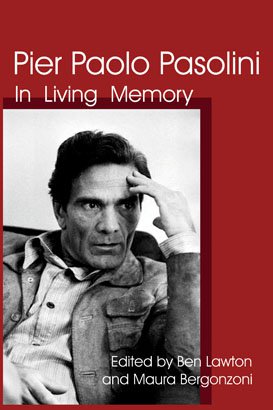
About the Author
Ben Lawton is Chair of Italian Studies at Purdue University. The expanded edition of his translation of Pier Paolo Pasolini’s Heretical Empiricism (Indiana UP, 1988) was republished by New Academia Publishing in 2006. In addition to being editor of 15 collections of essays on Italian and Italian American studies, which included among others Film Studies Annual, Romance Languages Annual, Italian Cultural Studies, and Purdue Studies in Romance Languages, he has published widely on Italian and Italian American film and literature.
Maura Bergonzoni holds a degree in Anglo-American literature from the University of Bologna and an M.A. in Comparative Literature from Purdue University. She is interested in Jewish-American Literature, Italian and Italian-American Cinema. She teaches English literature at “Manfredo Fanti” Liceo Scientifico-Linguistico.
PIER PAOLO PASOLINI: In Living Memory
Ben Lawton and Maura Bergonzoni, eds.New Academia Publishing, 2009
352 Pages
ISBN 978-0-9818654-1-6 Paperback
ISBN 978-0-9832451-8-6 e-Book
$9.99 e-Book
For BULK ORDERS, order directly from New Academia Publishing.
Order ebook from (Amazon Kindle) www.amazon.com; (Kobo) www.kobobooks.com; (Kobo Coupons) http://www.therawfeed.com; (Barnes&Noble Nook) www.bn.com; (Sony ReaderStore) http://ebookstore.sony.com; (Google Ebook Store) http://ebooks.google.com; (Ingram Digital) www.diesel-ebooks.com; iBookstore (iPad/iPhone); any ebook retailer.
Queries: orders@newacademia.com
About the Author
Ben Lawton is Chair of Italian Studies at Purdue University. The expanded edition of his translation of Pier Paolo Pasolini’s Heretical Empiricism (Indiana UP, 1988) was republished by New Academia Publishing in 2006. In addition to being editor of 15 collections of essays on Italian and Italian American studies, which included among others Film Studies Annual, Romance Languages Annual, Italian Cultural Studies, and Purdue Studies in Romance Languages, he has published widely on Italian and Italian American film and literature.
Maura Bergonzoni holds a degree in Anglo-American literature from the University of Bologna and an M.A. in Comparative Literature from Purdue University. She is interested in Jewish-American Literature, Italian and Italian-American Cinema. She teaches English literature at “Manfredo Fanti” Liceo Scientifico-Linguistico.
About the book
This collection of essays intends to continue the recognition of Pasolini’s teachings and of his role as engaged intellectual, not only as acute observer of the society in which he lived, but also as semiologist, writer, and filmmaker, always heretical in all his endeavors. The essays, culled from the AAIS/AATI Conference held in Genova, Italy, in 2006, are grouped according to thematic criteria. This decision was born not only of the desire to offer the reader a systematic organization of the texts, but also to foreground at least some of the areas that interest the ongoing academic research of the works and thought of Pasolini.
Many directors, reporters, and contemporary writers see in the “inconvenient intellectual” personified by Pasolini in his writings, in his films, and in his interviews, an emblematic figure with whom to institute and maintain a constant dialog, both because of the controversial topics he addressed, which are still relevant today, and because of the ways in which he confronted the power structures. His analytical ability made it impossible for him to believe in the myth of progress; instead, he embraced an ideal that pushed him always to struggle on the firing line of controversy.





 Coming Soon
Coming Soon Awards
Awards